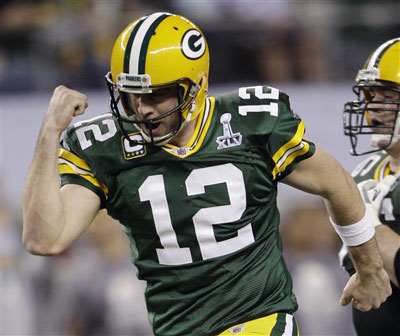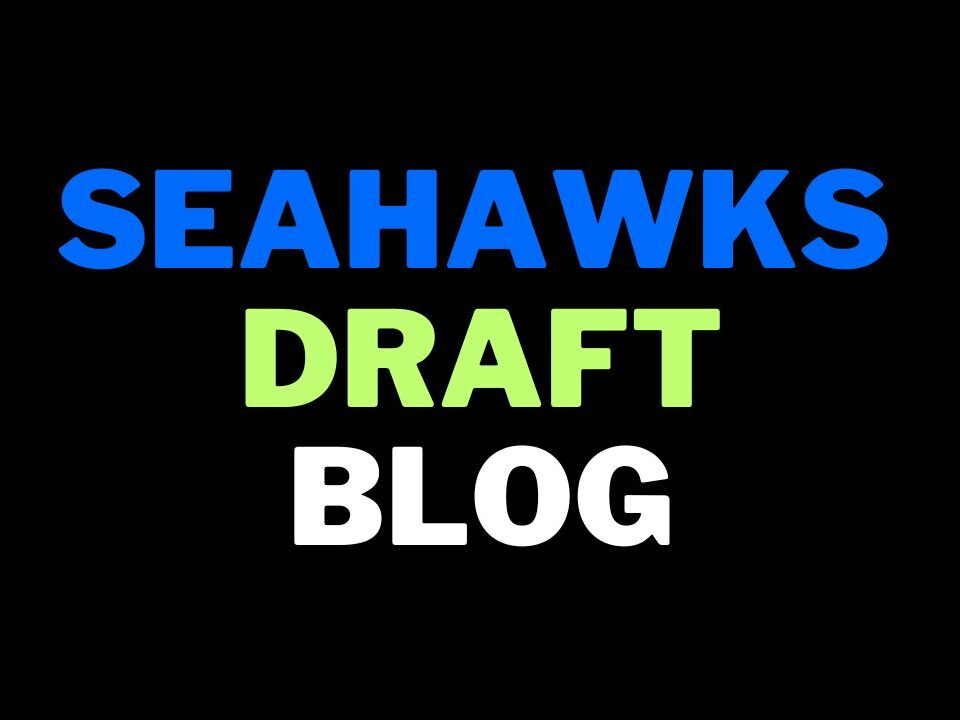
If nothing else, I'd like Seattle's next quarterback to make skipping fist pumps and invisible championship belts
Posted by Kip Earlywine
We don’t spend a lot of time talking about other NFL franchises here, but today I’d like to talk a little about John Schneider’s roots as a GM. Seemingly every time Mr. Schneider talks draft, he makes a reference to his time in Green Bay and the roster creation system he learned there under Ted Thompson. Even off the camera, our source has told us that Seattle won’t be trading up to draft a quarterback “unless Aaron Rodgers re-enters the draft.” Its not hard to figure out the original source of that quote.
When the Packers selected Aaron Rodgers, they were in a very similar situation. Brett Favre was the exact same age (within a month) that Matthew Hasselbeck is right now, and the Packers were fresh off a playoff appearance. They picked 24th. Hasselbeck is a free agent who may have played his final snap here, and Favre is a future HoF who still had gas in the tank, but simply in terms of being “in the zone” for a new quarterback, both teams compared well.
Rob Staton and Brandon Adams from 17power have long expressed a belief that none of the “big four” quarterbacks will escape the top 16 picks. Then again, Aaron Rodgers was considered a top 10 lock, and he became one of the more surprising prospects to fall in recent memory. If one of those “big four” quarterbacks reaches the 25th pick somehow, we could see history repeat itself.
Here is a video from NFL.com about the Packer’s draft strategy.
In my opinion, John Schneider was hired by Seattle for two primary reasons: his chemistry in interviews with Pete Carroll and his background with a proven and highly successful NFL front office. I suspect reason #1 was the bigger part of the decision, but its reason #2 that will reap the rewards for this franchise in the long haul. Since John Schneider frequently talks about bringing the Packers philosophy here to Seattle, I found the video linked above to be pretty interesting.
“19 of 22 Superbowl starters were either drafted by the Packers or undrafted free agents signed by the Packers.”
Building through the draft is a cliche uttered by just about every fan and front office alike, but Green Bay is one of the very best in the business at living by this mantra. In fairness, that statistic is somewhat inflated by a high number of injuries forcing depth players into starting roles, since this wasn’t opening day after all. It was the final game of the season when teams tend to be the least healthy. However you look at it, the bottom line is that Green Bay found success by using a highly disciplined and organized approach to the draft. A lot of the things we hear about the Packers in the video are things you could say about every front office, which to me points out the value of going the extra mile.
“They have an all-inclusive process… they want people with strong opinions… they want scouts who are evaluators, not just information gatherers… evaluators comes first, and one man makes the decision at the end of the day.”
For all I know, these same seemingly bland features could be true of every NFL front office. However, there was one part of this quote that really caught my ear; the part about wanting evaluators not just information gatherers. Quite often I read scouting reports that rattle off a list of components for a player while missing the point completely- what specific team and what system would this player be best served playing for? What do Steve Young, Brett Favre, Jake Plummer, and Michael Vick all have in common? They were talented quarterbacks who didn’t reach their potential until they landed on a second team that was a better fit for their skills.
A good scouting report should include these kind of details. Its not enough to ask yourself if a player has a bright future or not. Does he have a bright future for you? We can already confirm that John Schneider uses this method when scouting. In the latest example, our source mentioned to us that the front office loves Stephen Paea, but isn’t going to draft him. It seems silly to not draft a player you really like right? Well not if he’s an awkward fit for the defense and wouldn’t reach that potential you like so much. Paea is in my view a pure 4-3 one tech, very similar to Brandon Mebane. Unfortunately, that just isn’t a position that exists in the LEO defense, so like Mebane, Paea’s immense talent would go to waste if we drafted him at #25.
This seems like a contrast with Tim Ruskell’s regime, where he had a bit more of a grab-bag approach. He simply took players he liked, without considering chemistry or scheme. That’s how we ended up with guys like Brian Russell undermining our secondary, and picks like Deon Butler that were very hard to make sense of. Butler was a very good college player, and in some ways was a 2nd rounder on paper (outstanding character, hands, production, route running and sub- 4.4 speed). That’s why Tim Ruskell paid quite a bit to move up to get him, in Ruskell’s eyes Butler was probably a worthy 2nd rounder pick who fell into the 3rd. But what Ruskell didn’t consider was that Butler’s very small size would undermine his game as both a slot receiver and a deep threat, especially for a team that lacked a #1 wide-receiver. That’s why Butler lasted as long as he did, he was a great college receiver who sadly just didn’t have a niche in the NFL.
Tim Ruskell took a guy like Aaron Curry 4th overall because of outstanding athleticism, character, and work-ethic, but didn’t consider the needs of the roster or how a player like Curry wouldn’t come even close to filling the pass rushing shadow left by a departed Julian Peterson. Lawrence Jackson and Kelly Jennings were the same thing, players who passed the criteria but would never be vital components of a defense or fit into a grand scheme of things.
Not every pick John Schneider made last year followed his own rules. Golden Tate, much like Deon Butler, is a talented guy that probably doesn’t have a role in an NFL offense, unless the team gets very creative. Last year they didn’t use Tate to his strengths (his running back type qualities) and instead had him run post and fade routes deep, with predictably bad results. With the exception of Tate though, just about every pick Seattle made last year was a good fit, even a player like EJ Wilson who failed to stick but was a fit for the 5 technique. I completely expect this trend to continue in this years draft, and its why I’ve long suspected privately that Seattle probably wouldn’t pursue Ryan Mallett but would be seriously interested in Jake Locker or Colin Kaepernick (or Christian Ponder if the arm had checked out, which apparently it didn’t).
“…seventeen days there together, all the scouts are in the room, and they look at about three games on every single player (emphasis his) that any scout in that room has rated draft-able and some of their top free agents… it gives each scout a chance to look at his grades and compare it to what prospects from other sections of the country look like, and that helps them adjust their grades when they go to their final evaluation in the Spring. I think they are one of the few teams that does it for that amount of time.”
Again, this is probably something that I’m guessing many other front offices do as well. The only real difference here is the impressive amount of due diligence and time spent with this process. Charley Casserly states his belief that this is an unusually high amount of time and resources spent reviewing prospects. Scouting is well known to be a flawed and subjective “science,” so spending that extra time could pay dividends by ironing out some creases in the evaluation process. We don’t know for a fact that Seattle uses this method, but the talk about Kaepernick gaining “unanimous approval” would hint at such a process. And for what its worth, Schneider’s regime probably has one of the highest work ethics in the NFL, if judged from the number of roster moves they’ve made and how many trade avenues they sought over the last year.
“…remain [humble] with leadership, Ted Thompson does a great job with that. He operates under the radar because he doesn’t have a big ego, but the rest of the league respects him because of his ability to evaluate players.”
Without watching John Schneider work the war room, there really isn’t anyway of knowing if he’s an ego-maniac or a humble listener who values the opinions of others. John Schneider brought Ted Thompson’s system to Seattle, and we can only hope that he shares Thompson’s traits as well. The key to making a great decision is by considering as many opinions and as much information as possible. Its what made Thompson one of the best GMs in the NFL, and hopefully John Schneider will follow that example, if he isn’t already.


It breaks my heart to say this, but I believe we need to let the QB’s go this draft. Perhaps Enderle late, or bring in Froman (Louisville) as an UDFA. Let’s grab a Watkins or a Sherrod. Jimmy Smith sounds great, but he is Aquib Talib esque.
I have always been for drafting a QB… Sanchez still breaks my heart, but it is time to move on. Maybe next year.
Robert Gallery is 30, Danny Watkins 26. Do you really want to spend a first round pick on a guard coming into the league at that age? I think Watkins will be 27 as a rookie.
A lot has been said about this quarterback class, but the depth is unnatural and the quality above average. I still intend to do more homework on Kaepernick, but it appears there’s every chance five quarterbacks could go in round one. The Seahawks must consider the position.
I really like Watkins, but I’m completely baffled by his fringe 1st round draft stock. He’s 27 years old next year as a rookie and that’s IF there is even a season later this year. If the lockout cancels next season, then he’d be making his rookie debut at age 28.
If not for some January hype followed by a great senior bowl, Watkins would probably be a round 4-5 player by some brilliant GM who did his homework.
Abe Froman, the sausage king of Louisville?
I wanted Sanchez and Freeman and got smacked,,,going for the tri-fecta with Kaepernick this year.
It is interesting Kip, that GB gets lauded for “building through the draft”, yet New England has taken a back seat in that regard to GB. How many picks does NE have this year? I get the JS tie-in and all, but still am in awe of NE’s omnipresence on draft day.
Did’nt we let Ted Thompson slip away once upon a time?
I guess the difference is that Green Bay have actually been good at it. The Patriots drafts have been less than impressive over the last few years. Last year was pretty decent though
Exactly. New England is great at trading and stockpiling picks, they just suck at actually using them on players. Maybe that’s why they’re always trading for a pick from next year, they’re scared of picking wrong again.
I have much more faith in the talent evaluation of this FO then in years past. Ruskell played it way too safe and in hind sight, kind of dumb. He trades JPeterson (since he didn’t want to take a paycut) to draft an unproven OLB, when we could of made a step towards drafting Hass’s replacement with Mark Sanchez. And to top it, we could have addressed the OLine or DLine as well (Orakpo comes to mind…) with that #4 pick, instead he drafts the highest drafted LB ever.
I like AC, but right now, we don’t need an 8mil a year player that’s really good at covering TE in bump coverage. Aren’t LB’ers known as the “running backs” of defenses in regards to how common they are???
The Hawks actually meant to turn in the pick as CJ Wilson,DE, East Carolina but got mixed up and later had to cut the EJ Wilson,DE,North Carolina that they ended up with.
Is this a joke or for real?
Incredible if true.
In retrospect, my guess is that it is true. I remember the draft coverage guys even being perplexed by the pick, “did they mean C.J. Wilson?”. Of course there’s no way they will ever admit they screwed up that bad. The fact that E.J. was cut halfway through the season makes it even more plausible to me, they cut their losses as soon as they could.
EJ Wilson was projected to go around the 3rd or 4th round.
Cj wilson is a Packer. I wouldn’t doubt it in all honesty.
I have a hard time believing it was a mistake personally, if Seattle really did want CJ Wilson and meant to take him in the 4th round, meaning that he would have been higher on their draft board than Chancellor or McCoy, then why did they pass on him in the 5th and 6th rounds?
They seem like the same player anyway.